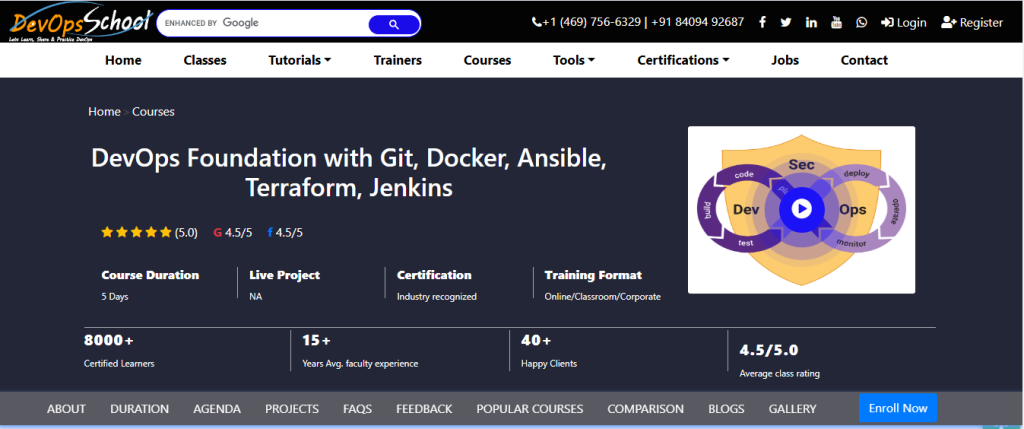
Introduced by DevOpsSchool in association with Rajesh Kumar from www.RajeshKumar.xyz, the DevOps Foundation Certification provides a structured pathway for understanding the fundamentals of DevOps, modernizing IT practices, and implementing successful DevOps strategies in real-world scenarios.
The DevOps Foundation Certification from DevOpsSchool is a globally recognized credential designed to validate your understanding of fundamental DevOps concepts, cultural practices, and key principles such as lean thinking, collaboration, automation, and measurement. Ideal for professionals from all backgrounds—developers, operations engineers, QA specialists, and IT managers—this certification demonstrates your readiness to foster a DevOps culture and contribute to delivering high-performing, resilient systems. Learn about eligibility, exam structure, and how it can boost your career here: DevOps Foundation Certification.
To prepare for certification and practical implementation, the DevOps Foundation Training Course provides a hands-on, interactive learning experience. Through instructor-led sessions, live labs, real-world case studies, quizzes, and mock exams, participants develop key skills in continuous integration and delivery (CI/CD), infrastructure-as-code (IaC), test automation, monitoring, and collaboration between development and operations teams. Designed for those starting their DevOps journey, this course empowers learners to build continuous, efficient, and scalable delivery pipelines. Discover the full curriculum and register here: DevOps Foundation Training Course.
1. Introduction to DevOps Foundation Certification
- Overview: Start with the growing significance of DevOps in transforming software delivery through automation, continuous integration, and collaboration. Highlight how DevOps practices reduce time to market, improve efficiency, and create a more productive workflow.
- Certification Objective: This certification aims to equip students with foundational DevOps knowledge, covering principles, tools, and real-world applications to enable faster, high-quality software delivery.
2. Target Audience
- Who Should Attend?: Ideal for IT professionals, developers, system admins, and software engineers looking to enhance their understanding of DevOps.
- Prerequisites: While this is a foundational course, some familiarity with basic software development and operations concepts is beneficial.
3. Key Learning Outcomes
- Strong Foundation in DevOps: Gain a practical understanding of core DevOps practices and principles.
- Skill Development: Develop skills in automation, CI/CD pipelines, infrastructure management, and secure DevOps practices.
- Real-World Preparedness: Acquire hands-on experience with DevOps tools, preparing for industry challenges.
4. Certification Agenda
| Module | Topics Covered | Description |
|---|---|---|
| Introduction to DevOps | – Welcome and Registration – Course Overview and Objectives – What is DevOps and Its Importance – Key DevOps Principles and Benefits – The DevOps Culture and Mindset | Covers the basics of DevOps, its significance in software development, and the mindset that supports DevOps practices. |
| DevOps Principles and Practices | – DevOps Lifecycle Stages – Continuous Integration (CI) and Continuous Delivery (CD) – Introduction to DevOps Tools | Provides a detailed overview of DevOps stages and essential practices like CI/CD, including tool introductions. |
| Git and Version Control | – Introduction to Git – Git Basics – Git in DevOps Workflows – Advanced Git Topics – Git Integration and Automation | Covers Git essentials, advanced Git techniques, and integration of Git in DevOps pipelines. |
| Docker Fundamentals | – Introduction to Docker – Docker Images and Containers – Docker Compose – Docker Networking and Volumes – Best Practices and Tips | Introduces containerization, Docker setup, Docker Compose for multi-container applications, and best practices. |
| Ansible for Configuration Management | – Introduction to Ansible – Setting Up Ansible – Ansible Playbooks – Running Ansible – Best Practices and Tips | Focuses on Ansible for automation, covering playbook creation, configuration, and effective usage. |
| Terraform for Infrastructure as Code | – Introduction to Terraform – Installing Terraform – Creating and Managing Infrastructure – Provisioning and Resource Management – Terraform Best Practices | Provides hands-on training on IaC with Terraform, resource management, and provisioning. |
| Jenkins for CI/CD Automation | – Introduction to Jenkins – Installing and Setting Up Jenkins – Creating Your First Jenkins Job – Jenkins Pipeline Fundamentals – Jenkins Plugins and Extensibility – Best Practices and Tips | Covers Jenkins setup, job creation, pipeline configuration, and using plugins for CI/CD. |
| Q&A and Certification Information | – Open Floor for Questions – Review of Key Takeaways – Certification Information | Open session for questions, final review, and details on obtaining the DevOps Foundation Certification. |
8. Certification Exam Details
- Exam Format: Multiple-choice questions, practical scenarios, and tool-based exercises.
- Passing Criteria: A minimum score requirement, with retake options if necessary.
- Validity: Certification is valid indefinitely, with optional advanced courses for continued learning.
9. How to Enroll
- Registration: Visit DevOpsSchool.com and complete the registration form for the DevOps Foundation Certification.
- Payment and Refunds: Multiple payment methods are available, with a flexible refund policy.
10. About the Trainer
- Rajesh Kumar: A seasoned DevOps expert with years of experience training professionals and implementing DevOps in real-world settings. Rajesh Kumar is known for his practical insights and effective teaching style.
- Website: For more information, visit his website at www.RajeshKumar.xyz.